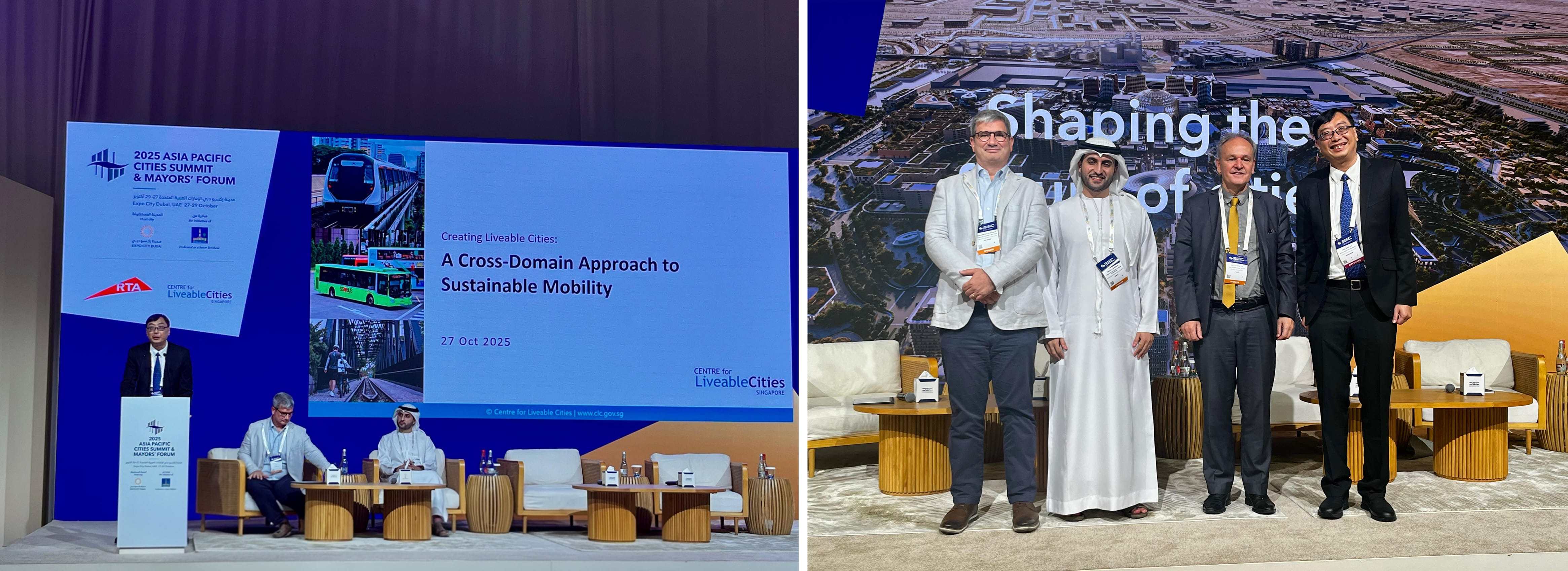Key Takeaways from the 2025 Asia Pacific Cities Summit (APCS) & Mayors’ Forum
19 November 2025
The 2025 APCS ran at Expo City Dubai from 26 - 29 October 2025. As a Knowledge Partner of the APCS, CLC was represented by Deputy Director, Research, Mr Tan Chee Seng, who shared on cross-domain approaches to sustainable mobility and liveability.
An initiative of the Brisbane City Council, the APCS is a global gathering that brings together city leaders, policymakers, and urban practitioners to exchange ideas and foster collaboration for sustainable and inclusive urban development. The event drew more than 150 mayors and leaders from over 300 cities worldwide.
Reinforcing the significance of such global conventions in driving multi-city collaborations to build resilience, share knowledge and drive sustainability solutions, keynote speaker Yuriko Koike, Governor of Tokyo, emphasised that cities must take the lead to protect our citizens in the face of growing uncertainties in the international landscape, climate change and technology development.

CLC’s Deputy Director, Research, Mr Tan Chee Seng, spoke at the Deep Dive Session on “Mobility: How Do We Connect Urban Communities to Opportunity Quickly, Sustainably and Affordably?”. His fellow panellists were RTA Dubai’s Mr Abdullah Al Hosani, and Mr Eric Huybrechts from L’Institut Paris Region who shared international perspectives on multimodal transport, smart mobility, and transit-oriented development. The session was moderated by Dr Benjamin Motte Baumvol of Sorbonne University Abu Dhabi.
Chee Seng highlighted that mobility should be seen not just as a transport issue but as a catalyst for broader outcomes, including safety, health, environmental quality, and equity. He introduced a Multi-Criteria Analysis (MCA) Framework, that CLC developed in collaboration with CENIT (Barcelona), to promote cross-domain urban solutions and help cities evaluate mobility interventions across four pillars—economic, mobility, environmental, and social & health. The framework captures both co-benefits and trade-offs often overlooked in standard transport assessments.
Applying the framework across diverse city contexts has shown how sustainable mobility interventions can generate shared outcomes across domains. Cities that have reallocated street space for walking, cycling, and public life have seen cleaner air, safer streets, and stronger community ties, while also confronting challenges such as traffic displacement or rising property values.
These findings demonstrate how a data-driven, cross-domain approach enables more transparent, outcomes-based decision-making and helps cities balance complex trade-offs.
Chee Seng also emphasised that interdisciplinary collaboration is not an option but a necessity in addressing today’s interconnected urban challenges. Integrating mobility planning with housing, health, energy, and land use helps cities design urban systems that promote accessibility, inclusion, and resilience, which are key foundations of long-term liveability.
CLC looks forward to furthering the conversation on Sustainable Mobility in building liveable, sustainable and resilient cities at the World Cities Summit next year. Do download our e-publication “Creating Liveable Cities: A Cross-Domain Approach to Sustainable Mobility” here.
Contributed by: Tan Chee Seng, Deputy Director, Research
